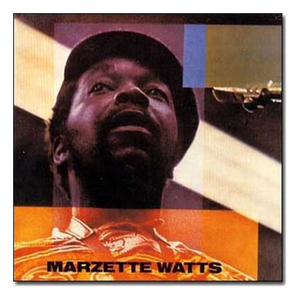
| Trackimage | Playbut | Trackname | Playbut | Trackname |
|---|---|---|---|---|
| 84538214 | Play | Backdrop for Urban Revolution | 00:00 Tools | |
| 84538216 | Play | Geno | 00:00 Tools | |
| 84538215 | Play | Ia | 00:00 Tools | |
| 84538217 | Play | Backdrop for Urban Revolution (edit) | 00:00 Tools | |
| 84538218 | Play | Play it straight | 00:00 Tools | |
| 84538219 | Play | Lonely woman | 00:00 Tools | |
| 84538224 | Play | la | 00:00 Tools | |
| 84538220 | Play | Medley | 00:00 Tools | |
| 84538221 | Play | Joudpoo | 00:00 Tools | |
| 84538223 | Play | F.L.O.A.R.S.S. | 00:00 Tools | |
| 84538222 | Play | Octobersong | 00:00 Tools | |
| 84538225 | Play | October Song | 00:00 Tools | |
| 84538226 | Play | Backdrop for Urban Revolution [Edit] | 00:00 Tools | |
| 84538227 | Play | Floarss | 00:00 Tools |

-
- 2,988
- plays
-
- 632
- listners
-
- 2988
- top track count
Marzette Watts (March 9, 1938, Montgomery, Alabama - March 2, 1998, Nashville) was an American jazz alto saxophonist. He had a brief career in music but is revered for his 1966 self-titled free jazz release. Watts played piano early in his life, but did not play music regularly in his teens. He studied at Alabama State College, where he was a founding member of SNCC; this association led to his being forced to leave the state at the behest of the governor of Alabama. He moved to New York, where lived in a loft building on Cooper Square which also had as a tenant Leroi Jones (later Amiri Baraka), with whom he participated in the Organization of Young Men. Watts returned to college in New York, completing his studies in 1962; he then moved to Paris to study painting at the Sorbonne and began playing saxophone for extra money. Returning to New York in 1963, he studied under Don Cherry and played in his loft and around the city with Jiunie Booth, Henry Grimes, J.C. Moses, and others. He also developed his painting ability, producing work strongly influenced by that of Willem De Kooning. Marzette's loft attracted many established and up-and-coming musicians, who would hang out and at times play for parties, including Ornette Coleman, Cecil Taylor, Don Cherry, Archie Shepp, and Pharoah Sanders. In 1965 he decided to devote himself to music more fully, and moved to Denmark for further study. While in New York in 1966, he recorded an album for ESP-Disk, and recorded for Savoy Records in 1968. He wrote film scores and did production work for his own films, eventually abandoning music to work in film and record production. Later in his life he moved back and forth between Europe and New York, teaching briefly at Wesleyan University. Late in his life he moved to California. He died of heart failure in 1998. Read more on Last.fm. User-contributed text is available under the Creative Commons By-SA License; additional terms may apply.